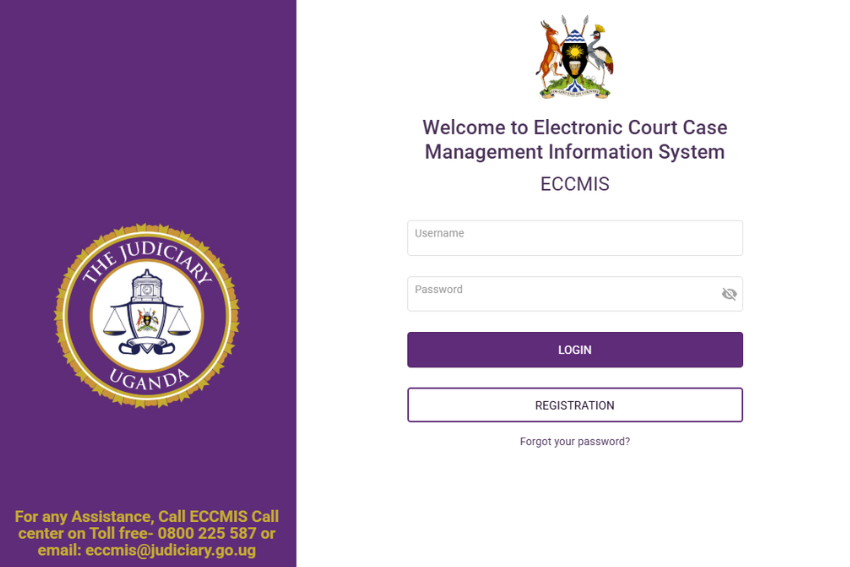Electronic Court Case Management Information System (ECCMIS) is transforming the operation of the courts in Uganda. It is an electronic system that was aimed to make justice more rapid, accessible and transparent. No more searching through musty file cabinets or waiting weeks to find out what is happening. It is taking court procedures into the heart of the digital age and it is paying off in a very big way.

The following are some of the aspects we are going to explain in detail about what ECCMIS is, why it was formed, what its key components are, and how it is affecting the Ugandan judicial system.
What Is ECCMIS and Why Does It Exist?
Consider a court where all the paper had been dumped. Case records are misplaced. Hearing is delayed. Individuals have to wait years to have justice. It is what used to be the case with many courts in Uganda until ECCMIS appeared. ECCMIS is a web-based system launched by the Judiciary of Uganda in October 2021 and which automates the entire process of case management, including filing a case registration, serving a judgment. The center of its mission? To facilitate judicial procedures, reduce turnaround time and bring the justice closer to all.
The idea of ECCMIS is straightforward yet very strong. It addresses such persistent problems as case backlogs, misplaced files and sluggish interactions between courts and the community. The platform achieves this by changing the dependency on paper-structure that means that case information is secure, can be retrieved quickly, and shared easily. It is not all efficiency, it is also about ensuring people have faith on the justice system. People desire a system with which they can depend and ECCMIS is working to provide.
Key Features of ECCMIS
What is special about ECCMIS then? It is loaded with functions that make the job of courts, lawyers and even common individuals in a case easy. This is a closer examination of what it has to offer:
Electronic Filing and Document Management
No more visits to a courthouse using reams of papers. ECCMIS allows self-represented people and lawyers to file records online. Everything is either posted as a new case or as an update on an existing one and all this is uploaded on a secure portal. This minimizes paper exercise and possibility of misplacing files. Moreover, court employees can save and retrieve files by the help of a few clicks.
Case Tracking and Status Updates
Have you ever been curious what is up with your case? ECCMIS have you covered. The system makes available up to date reports on cases. The litigants can check the status of their cases on a publicly available portal or even through their phones using an SMS. This aspect puts everyone on track-lawyers, plaintiffs, defendants, and other court members. User is done with going after clerks to give him solutions.
Automated Case Assignment and Scheduling
ECCMIS removes the guess work in judicial assignments. It is a fair and efficient system because arbitrarily the system automatically assigns cases according to set rules. It also makes appointments and sends notifications therefore no one can be left without a court date. This assists courts to adhere to schedules and minimizes on delays.
Online Payments
The act of paying court fee, fine or bail involved lengthy queues. Not anymore. ECCMIS provides online payment options by using mobile money, Visa or electronic funds transfer (EFT). It is quick, safe, and convenient, particularly in the case where individuals live far off the court buildings.
Analytics and Reporting
Information is the power and ECCMIS deploys it to enhance the judicial system. The system also produces statistics about the trends in cases, court work and so on. This could illustrate the example of what kind of cases are the most frequent or what is the duration of a case. Judges and court administrators can use these insights to make improved decisions and solve bottlenecks.
Notifications and Communication
ECCMIS puts everybody in the know. It makes automatic SMS, mail, or system messages. It could be a hearing date, new filing, or a judgment, parties know immediately. This saves confusion and makes sure such an individual does not fail to get important information.
Paperless Case Management
ECCMIS takes a case through its digital lifecycle in full. Once the case is filed, it passes through the mediation, hearing, judgment, and even archiving processes without the paper. This saves more time besides making old cases easier to be referred.
The Impact of ECCMIS on Uganda’s Judicial System
The Uganda courts have had a game changing effect with the introduction of ECCMIS. What, however, are its effects? So, how is it revolutionizing the delivery of justice? Let us find out.
Faster Case Processing
The issue of cases backlogs is not new in the Uganda courts. ECCMIS is addressing this through automation of processes that once used to consume hours or days. The preparation of cases, their scheduling and monitoring is now faster, time taken in the system of the cases is reduced. During the launch of the system, Chief Justice Alfonse Owiny Dollo observed that ECCMIS is of significant use in ensuring it handles the backlog of cases besides improving on delivery of justice.
Greater Transparency
Trust is developed with transparency. Case information is disclosed online and accessible by the population with the aid of ECCMIS. Not only is it possible to read about the course of a case, including hearing dates or judgments, everyone can do that without going to a courthouse. This transparency limits chances of corruption and means that judicial proceedings are fair and responsible.
Improved Access to Justice
Everybody does not have a courthouse in their neighborhood. It is time consuming and poses a burden to physically access a court to file or check a case to individuals in the rural areas. ECCMIS facilitates access to justice because it enables filing and payment of cases online, as well as tracking. The system is also inclusive because updates can be made through even a normal SMS.
Reduced Administrative Burden
Court personnel would waste hours taking care of paperwork. Now, ECCMIS automatizes many things. Instead of sorting out the paperwork, the clerks can prioritise the more valuable activities, as such as helping judges or litigants. This effectiveness saves costs and results in the quality of the operations of the court.
Enhanced Security of Records
The physical files could be misplaced, spoilt or altered. Everything is in a secure system storing all the files digitally hence there is minimal risk of lost or misplaced files. This helps so that critical case information can be found whenever required.
Support for Virtual Hearings
The pandemic presented the crisis situation to reveal the necessity of virtual court alternatives. ECCMIS facilitates virtual hearings because of the digital access to the case files and communication instruments. It became a lifesaver in the process of lockdowns and so far, it helps the court proceedings to be more flexible.
Challenges and Room for Improvement
Nothing is flawless and there are challenges of ECCMIS. The system may be difficult to access in certain parts of Uganda due to poor internet connectivity especially in the rural areas. Another challenge is training; the court staff and the lawyers should constantly be supported to facilitate the utilization of the system. There is the problem of digital literacy too; not all people are comfortable with on-line platforms.
To counter that, the Judiciary of Uganda is collaborating with the partners, such as the Synergy International Systems, in offering the training and technical assistance until 2025. There is also a need to open up internet connectivity and make ECCMIS user friendly to many.
Looking Ahead: The Future of ECCMIS
ECCMIS is a young industry but its prospects are enormous. It will continue to change the judicial system in Uganda as it is being introduced to various courts such as the Magistrates Court, Court of Appeal and the Supreme Court. It has plans to incorporate additional, more advanced functions, such as the use of artificial intelligence to analyze a case or blockchains to store records securely. These may propel ECCMIS to a new dimension and become justice even quicker and more efficient.
Uganda is already leading in the ECCMIS, and other countries are already emulating the country, such as in the case of Namibia. This portrays its impact on the world since it inspires the smarter justice system outside the boundaries of Uganda.


